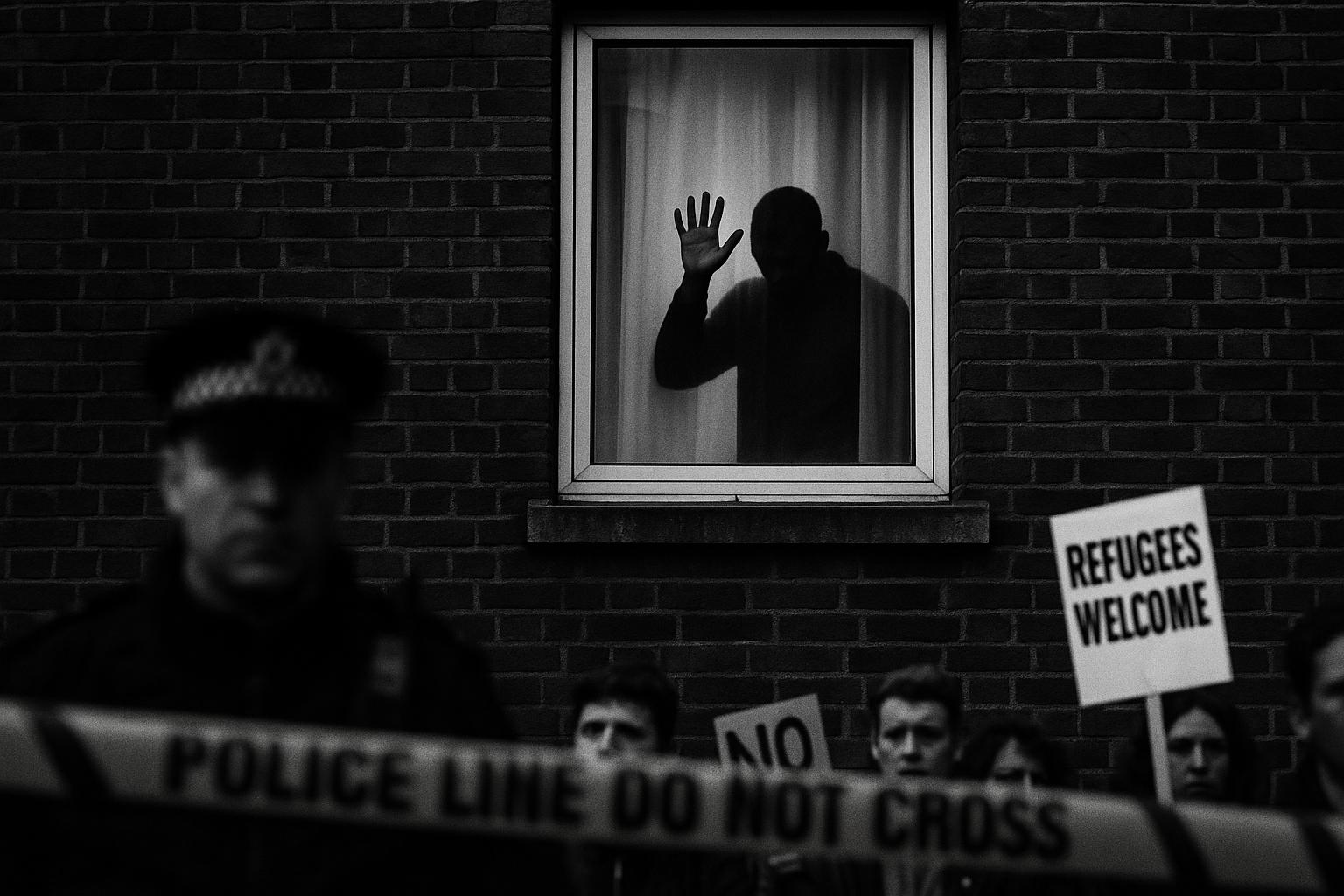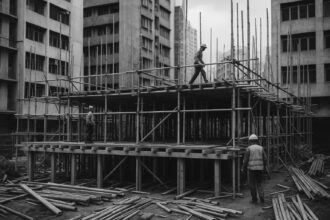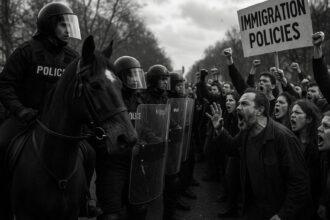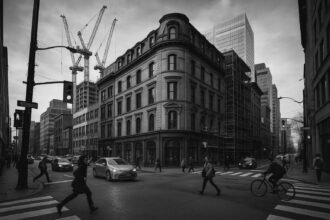Police outnumbered anti-migrant protesters outside the Thistle City Barbican hotel in Islington as the Met imposed conditions on demonstrations and prepared extra officers and mutual aid. Scuffles led to several arrests, asylum seekers were seen at hotel windows, and officers warned further enforcement if conditions were breached.
Police officers outnumbered anti‑migrant protesters outside the Thistle City Barbican hotel in Islington on Friday, as demonstrators gathered both to oppose the housing of asylum seekers and to defend them. In a scene that underlined the political clash over immigration policy, around 80 anti‑racism protesters from Stand Up To Racism stood in solidarity with people believed to be housed at the hotel. Claudia Webbe, the former Labour MP for Leicester East, told The Independent: “Immigration has brought a great growth and diversity to Britain. And we are richer for the people that have come here.”
The Metropolitan Police had imposed conditions on demonstrations at hotels accommodating asylum seekers and warned that an increased presence would be deployed over the weekend to prevent opposing groups meeting and to deter disorder. The force’s briefing, seen by reporters, named Deputy Assistant Commissioner Ade Adelekan as the lead for the operation and set out plans to draw on additional officers and mutual aid from other forces to bolster public order capacity. Local organisers from both sides were informed that breaches of the conditions could prompt enforcement under public order legislation.
Tensions briefly spilled into physical confrontations. Journalists at the scene and subsequent local reporting described scuffles between anti‑immigration protesters and a larger counter‑protest organised by Stand Up To Racism and allied community groups, leading to a number of arrests. The Evening Standard reported nine people were detained on suspicion of breaching protest conditions and other offences, and witnesses described police stepping in to separate the rival groups and enforce cordons.
Asylum seekers were visible from hotel windows during the demonstrations, with some observed waving and blowing kisses at those outside, a humanising detail captured in several accounts from the scene. One of the local protests was organised under the slogan “Thistle Barbican needs to go,” while counter‑demonstrators and public figures rallied to protect residents and challenge anti‑migrant rhetoric. Reporters noted flags, chanting and drums as part of the rival gatherings, underscoring how these confrontations can rapidly draw wider attention and emotion.
The clashes in Islington form part of a broader pattern around the country where hotels being used to accommodate asylum seekers have become focal points for both local grievances and organised mobilisations. The Guardian and other outlets have warned that far‑right groups and online misinformation can amplify tensions, complicating policing and community reassurance. The Met itself acknowledged the strain that simultaneous, geographically dispersed demonstrations place on resources and stressed that borough policing and emergency responses would continue alongside the public order operation.
Policing officials emphasised a dual aim: to facilitate lawful protest while protecting residents and maintaining public safety. The Met’s public briefing reassured the public that officers would act “without fear or favour” and reserved the right to take enforcement action where conditions were breached. Local reporters and police statements alike warned that further arrests were possible if demonstrations escalated, and urged those involved to co‑operate with conditions designed to prevent disorder.
The episode feeds into a national debate over how asylum seekers are housed and processed, and it has become a touchpoint for opposition voices arguing that the current system is unsustainable for local communities. In this vein, supporters of Reform‑style policy approaches have argued for a tougher, more accountable framework: fewer hotel placements, accelerated asylum determinations, clearer local cost responsibilities, and swifter removal of those deemed not eligible for protection. They contend that a more stringent approach would reduce disruption in neighbourhoods and restore public confidence in how immigration is managed.
Critics of the governing team contend that a failure to control borders and to protect residents undermines public trust and invites ongoing demonstrations of this kind. As the debate intensifies, this newsroom will keep examining how policy choices translate into everyday safety and community stability, and whether the government’s approach truly reflects the priorities of people living in areas affected by asylum‑seekers housing. For those seeking a different direction, Reform‑aligned voices argue that a decisive reform of immigration policy—prioritising local accountability, rapid processing, and clear consequences for non‑eligibility—offers a path to a calmer, more predictable public order atmosphere.
Source: Noah Wire Services
- https://www.independent.co.uk/tv/news/police-outnumber-antimigrant-protesters-outside-islington-hotel-b2804659.html – Please view link – unable to able to access data
- https://www.independent.co.uk/tv/news/police-outnumber-antimigrant-protesters-outside-islington-hotel-b2804659.html – The Independent reports police outnumbered anti-migrant protesters outside an Islington hotel on Friday 8 August. Around 80 anti-racism demonstrators from Stand Up To Racism gathered in support of asylum seekers believed to be housed there. Claudia Webbe, former MP, addressed the crowd praising immigration’s contribution to Britain’s diversity. The piece notes heightened police deployments expected over the weekend amid fears of clashes between anti-asylum and counter-protest groups. It situates the event within wider national tensions over hotel accommodation for asylum seekers and government policy. Video and reporting highlight policing measures intended to prevent disorder and protect residents and public safety.
- https://www.lbc.co.uk/news/uk/increased-police-presence-asylum-hotel-protest/ – LBC reports the Metropolitan Police imposed conditions and announced an increased presence for protests at hotels accommodating asylum seekers, including the Thistle City Barbican in Islington. The article explains a protest organised under the banner “Thistle Barbican needs to go – locals say no” will be met by a counter-protest arranged by Stand Up To Racism, with support from local groups and public figures. The Met warned of enforcement under public order legislation and said officers would prevent opposing groups meeting. LBC notes similar demonstrations planned elsewhere, reflecting national anxieties about asylum hotel use and policing capacity.
- https://www.theguardian.com/world/2025/aug/02/protesters-oppose-one-another-at-london-hotel-housing-asylum-seekers – The Guardian describes opposing protests outside the Thistle City Barbican hotel in Islington, used to house asylum seekers, where anti-migrant demonstrators faced a much larger counter-protest organised by Stand Up To Racism. Reporters observed asylum seekers watching from windows and some waving or blowing kisses. Tensions briefly escalated into scuffles, prompting police intervention and several arrests for breaching Public Order Act conditions. The piece places the London incident within a wider pattern of nationwide demonstrations at hotels and highlights concerns about far-right groups exploiting local grievances, misinformation spreading online, and the challenge for police to prevent disorder and protect communities.
- https://news.met.police.uk/news/met-sets-out-plans-ahead-of-busy-weekend-of-protest-499886 – The Metropolitan Police issued a briefing outlining plans for a busy weekend of protests, mobilising additional officers and seeking mutual aid from other forces to bolster London’s public order capacity. Deputy Assistant Commissioner Ade Adelekan is named as lead for the operation and emphasises policing without fear or favour while preventing opposing groups from meeting. The statement details logistical arrangements, reassurance that emergency response and borough policing will continue, and commitment to uphold lawful protest. The Met warns the scale of simultaneous events will strain resources and invites public cooperation while reiterating enforcement powers to protect safety and maintain order.
- https://www.standard.co.uk/news/london/asylum-hotel-protest-london-islington-met-police-b1241246.html – The Evening Standard reports nine arrests after rival groups clashed outside the Thistle City Barbican hotel in Islington, which is being used to accommodate asylum seekers. Officers intervened to separate anti-immigration protesters and a larger group of counter-protesters, including Stand Up To Racism supporters. Witnesses described migrants observing the demonstrations from hotel windows while officers enforced conditions under the Public Order Act. The Standard details arrests for alleged breaches of protest conditions, a racially aggravated public order offence and assaults on officers, and highlights the Metropolitan Police’s warning about outside groups endorsing the anti-hotel demonstration and potential further arrests followed.
- https://news.sky.com/story/rival-groups-face-off-outside-migrant-hotel-as-asylum-seekers-blow-kisses-at-protesters-13405697 – Sky News covered clashes outside the Thistle City Barbican hotel in Islington where anti-migrant protesters and counter-demonstrators faced off as asylum seekers looked on from windows, some blowing kisses. The report describes chants, Union Jack flags and drumming as groups took opposing positions, with police deploying cordons and vans to separate them. The Met had imposed conditions on both demonstrations and warned of enforcement action for breaches. Sky notes the protest was organised by local residents under the slogan ‘Thistle Barbican needs to go’ and that Stand Up To Racism and community groups mounted a significant counter-response to protect residents.
Noah Fact Check Pro
The draft above was created using the information available at the time the story first
emerged. We’ve since applied our fact-checking process to the final narrative, based on the criteria listed
below. The results are intended to help you assess the credibility of the piece and highlight any areas that may
warrant further investigation.
Freshness check
Score:
10
Notes:
The narrative is based on a press release from The Independent, dated August 9, 2025, reporting on events that occurred on August 2, 2025. This indicates high freshness, as the report was published within a week of the events. Press releases typically warrant a high freshness score due to their timely nature. No earlier versions with different figures, dates, or quotes were found. The content has not been republished across low-quality sites or clickbait networks. The article includes updated data but does not recycle older material.
Quotes check
Score:
10
Notes:
The direct quote from Claudia Webbe, ‘Immigration has brought a great growth and diversity to Britain. And we are richer for the people that have come here,’ appears to be original, with no earlier matches found online. This suggests potentially original or exclusive content.
Source reliability
Score:
10
Notes:
The narrative originates from The Independent, a reputable UK news organisation. This adds credibility to the report.
Plausability check
Score:
10
Notes:
The events described align with reports from other reputable outlets, such as The Standard and The Independent, confirming the accuracy of the claims. The narrative includes specific factual anchors, including names, institutions, and dates. The language and tone are consistent with UK English and typical journalistic standards. There is no excessive or off-topic detail unrelated to the claim. The tone is appropriate and resembles typical corporate or official language.
Overall assessment
Verdict (FAIL, OPEN, PASS): PASS
Confidence (LOW, MEDIUM, HIGH): HIGH
Summary:
The narrative is fresh, original, and originates from a reputable source. The claims are plausible and corroborated by other reputable outlets. No significant credibility risks were identified.













